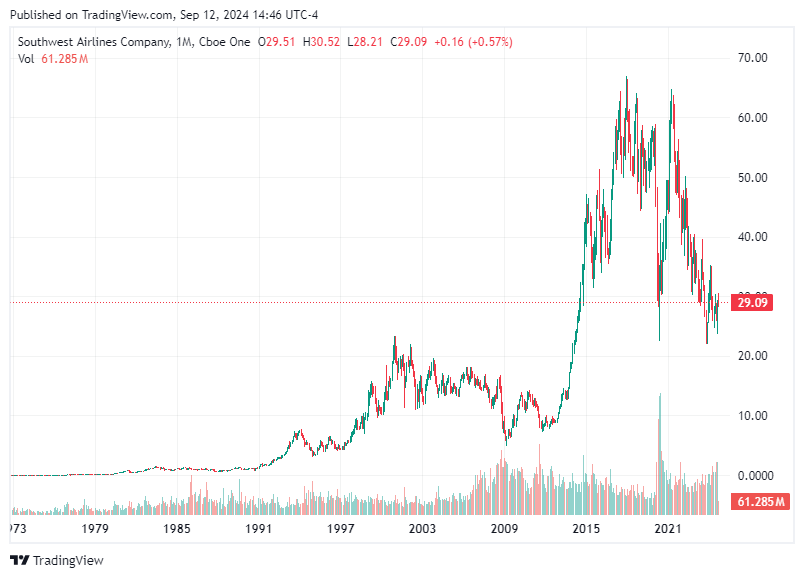Southwest Airlines Revamps Board Amid Investor Influence
Southwest Airlines Revamps Board Under Activist Influence.

Disclaimer: The following article provides a detailed examination of Southwest Airlines' recent board restructuring influenced by activist investor Elliott Management. The contents herein are intended for informational purposes only and should not be construed as financial or investment advice. Any opinions expressed are those of the author and do not necessarily reflect the views of Southwest Airlines or Elliott Management.
We are working endlessly to provide free insights on the stock market every day, and greatly appreciate those who are paid members supporting the development of the Stock Region mobile application. Stock Region offers daily stock and option signals, watchlists, earnings reports, technical and fundamental analysis reports, virtual meetings, learning opportunities, analyst upgrades and downgrades, catalyst reports, in-person events, and access to our private network of investors for paid members as an addition to being an early investor in Stock Region. We recommend all readers to urgently activate their membership before reaching full member capacity (500) to be eligible for the upcoming revenue distribution program. Memberships now available at https://stockregion.net
Southwest Airlines, a stalwart in the aviation industry known for its low-cost business model and customer-centric approach, is undergoing changes at the board level. This restructuring comes in response to pressure from Elliott Management, an activist investment firm led by billionaire Paul Singer. The developments signal a pivotal moment for the airline as it navigates investor expectations, leadership transitions, and operational challenges.
Elliott Management's Influence
Southwest Airlines has long been admired for its consistent profitability, employee-friendly policies, and reliable service. However, recent years have brought challenges that have impacted its performance. The airline's stock price has experienced a notable decline, dropping by more than half over the past three years. This downturn can be attributed to various factors, including increased competition, operational disruptions, and changing consumer preferences.
One critical incident that highlighted operational challenges was the massive flight cancellations in December 2022. A combination of severe weather conditions and outdated technology led to a breakdown that cost the airline over $1 billion. Elliott Management, known for its assertive approach to investment, has acquired a 10% stake in Southwest Airlines. The firm has been vocal about its dissatisfaction with the airline's current leadership. Elliott's primary concerns revolve around Southwest's ability to adapt to market changes and enhance shareholder value. The investment group has advocated for a leadership shakeup, including the replacement of CEO Bob Jordan and Executive Chairman Gary Kelly.
Elliott Management argues that changes in leadership are crucial for Southwest to regain its competitive edge and improve its financial performance. The firm's influence in the boardroom has been growing, leading to critical discussions about the airline's future direction.
Board Restructuring and Leadership Changes
In response to Elliott Management's demands, Southwest Airlines has announced a partial overhaul of its board of directors. Six board members are set to depart in November, making way for four new independent directors. Some of these new appointments may be candidates proposed by Elliott, which reflects its growing influence in shaping the airline's governance structure.
Gary Kelly, who has been with Southwest for nearly four decades and has served as both CEO and Executive Chairman, has announced his retirement. He will step down after the 2025 annual meeting. Kelly's departure marks the end of an era for the airline, as he has played a pivotal role in its growth and success over the years. Despite Elliott's calls for leadership changes, Southwest's board has expressed unanimous support for CEO Bob Jordan. Jordan, who took over as CEO in early 2022, has been tasked with leading the airline through a period of transformation. The board's decision to back Jordan reflects confidence in his ability to drive the necessary changes while maintaining the company's core values.
The restructuring of Southwest's board is expected to have significant implications for the airline's governance and strategic direction. By introducing fresh perspectives and expertise, the new directors are likely to influence key decisions related to operational efficiency, technological upgrades, and customer experience enhancements. Elliott Management's involvement suggests a more aggressive approach to pursuing profitability and shareholder returns. This could lead to strategic shifts aimed at boosting revenue, optimizing costs, and expanding market presence. However, balancing these goals with Southwest's reputation for employee satisfaction and customer loyalty will be a critical challenge.
Challenges and Opportunities
Southwest Airlines faces various challenges as it implements these changes. Modernizing its technology infrastructure is a priority to prevent future operational disruptions. The airline must also address evolving consumer preferences, such as increased demand for seamless digital experiences and sustainable travel options.
The board restructuring presents opportunities for Southwest to reinvigorate its brand and reaffirm its position as a leader in the low-cost carrier segment. By leveraging the expertise of new board members and aligning with investor expectations, the airline can enhance its competitive advantage and explore new growth avenues. The changes at Southwest Airlines could set a precedent for how other airlines respond to activist investor pressures. As the industry navigates post-pandemic recovery, economic uncertainties, and environmental challenges, governance and leadership decisions will be under increased scrutiny.
Southwest's ability to successfully execute its transformation strategy will have far-reaching implications. If the airline can balance profitability with its cultural values, it may serve as a model for other carriers seeking to adapt in a rapidly changing landscape. Southwest Airlines' board restructuring under the influence of Elliott Management marks a significant chapter in the airline's history. As the company embarks on this transformative journey, it must navigate complex dynamics between investor demands, leadership transitions, and operational improvements. The outcome of these efforts will not only shape Southwest's future but also provide valuable insights for the broader airline industry.
Disclaimer: This article is intended for informational purposes only and does not constitute financial or investment advice. Readers are encouraged to conduct their own research and consult with a qualified financial advisor before making any investment decisions.


